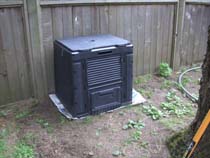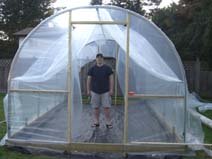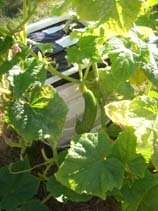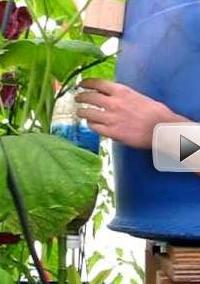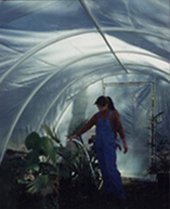|
Compost Bin: Set up, Maintenance, and the proper things to add to the pile.Building Healthy Soil - a great Trailer for a Great Movie - "Dirt the Movie". Food 4 Wealth - Jonathan White's all about Dirt. Garden Bin - it is said that 1/3 of a Families waste could be composted. A compost bin is a great way to have nutrient rich organic fertilizer on hand for free. A great thing when greenhouse gardening. Compost is a nutrient rich soil that is produced using your everyday kitchen scraps that would normally make it's way into our land fills. We spent some time on the weekend setting up a compost bin, I got it a while ago and stored it away because I had my heart set on a tumble composter. Anyways I got over it and made it a project. We added the soil from some of the self watering containers - build your own plans that we were using to grow some vegetables last season. We now keep a scrap container under the sink and have been constantly adding to it. It is estimated that nearly 1/3 of household waste can actually be composted. No one makes a case for composting better than Jonathan White of Food4Wealthbonus.com - take a look at the Food 4 Wealth - review here. It is a great method for growing. Some people shy away from composting because it is not simplified, and is made out to be a science. All it is, is organic items decomposing. Mother nature takes care of that, and it is difficult for any of us to screw that up. All that we have to do is help it out with a few things. We have to make sure that it is well ventilated,that a 1:1 mixture ratio is added of greens and browns (see below). And make sure that the mix is moist while it decomposes. If you would like to have a better relationship or understanding of "dirt", we highly suggest checking out the movie Dirt the movie - See the Trailer here Moisture Level: an easy judge of moisture is that the mix should feel like a wrung out sponge. Keep it simple - no need for a moisture meter necessarily. Unless you like those type of gadgets, and they fit the budget. Compost and Gardening System: Food 4 Wealth - ReviewHere are some of the "Green" materials that can be added to the compost bin:
Green waste materials provide moisture for your compost and are rich in nitrogen, and are quick to rot.They increase the temperature of the compost mix. Here are some of the "Brown" materials that can be added to the compost bin:
"Brown" waste materials decompose slowly, and create air pockets in the compost helping with ventilation.They soak up excess moisture and create a balance from the green waste. They are also rich in Carbon. Compost and Gardening System: Food 4 Wealth - ReviewThese are a few things that should be avoided:
|
Please Help Us Get Social:
Valued Links and Featured Sites:
Greenhouse Plans
Free Greenhouse Gardening Construction Plans
"Ole Dirt Farmer"

Self Watering Container Plans
Don't want to make your own. There is also information about Earthboxes too.
These are great, either or.
Free Self Watering Container Plans
Jonathan White: Food 4 Wealth
It is a great fit. Be sure to take a look. Jonathan is a passionate guy. See below for our full review.
Aquaponic Plans
Links on this page will take you to Travis's free e-book.
A Malispina college student shares a video of her completed Barrelponic project. Complete with Tilapia.
Free Aquaponics (Fish and Vegetables) Plans





